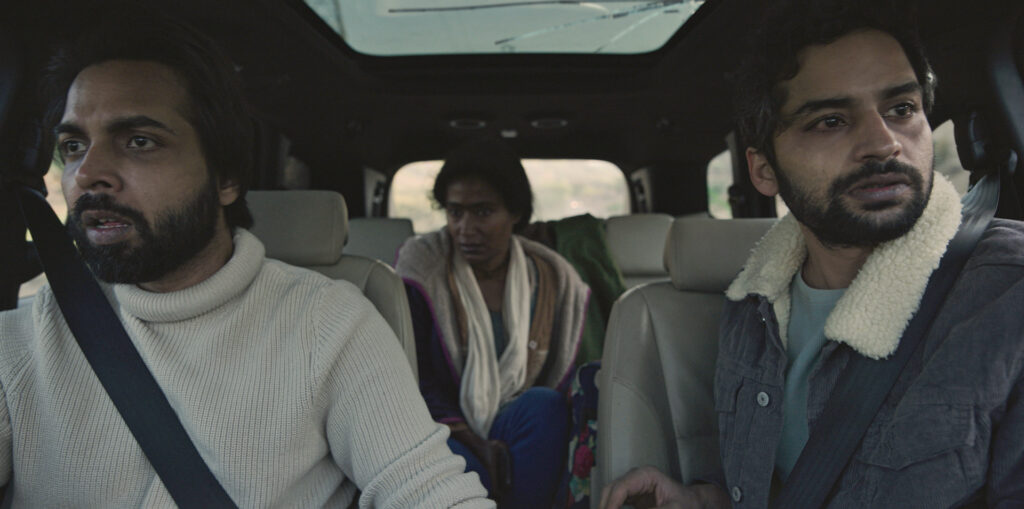Karan Tejpal’s debut feature, Stolen (2023), which premiered in the Orizzonti Extra section at the 2023 Venice Film Festival and is now streaming on Prime Video, is at its heart a piercing examination of complicity, conscience, and class. What starts as a taut crime drama gradually evolves into a morally charged odyssey that lays bare the uneasy interplay between guilt, privilege, and the quiet corruption beneath social indifference.
Gautam Bansal (Abhishek Banerjee) arrives at a railway station in a rural town to pick up his brother, Raman Bansal (Shubham Vardhan), ahead of their mother’s wedding reception the next day. But the night takes a dark turn when the infant child of Jhumpa (Mia Maelzer), a tribal daily wage labourer, is abducted by a woman connected to a trafficking gang. A misunderstanding places Raman under suspicion, but the dust of confusion settles soon. Disturbed by the police’s callous indifference and Jhumpa’s anguish, Raman chooses to help her, much to the disapproval of his older brother, Gautam. As the night unravels into chaos and the first light of morning reveals deeper truths, they soon find themselves embroiled in a perilous situation they neither anticipated nor fully understand, one that threatens to upend their lives…
Tejpal grips us from the outset and never loosens his hold till the end credits roll. The reason lies squarely in the film’s rigorously structured screenplay, co-written by Tejpal, Gaurav Dhingra, and Swapnil Salkar, which establishes its tone and urgency from the very first frame. The opening sequence at the railway station is not only atmospheric but narratively crucial. It signals that the events will unfold over less than twenty-four hours, lending the film a ticking-clock intensity. There’s no narrative drag in this pulsating tale. Each sequence drives the story forward with precision and purpose. And yet, amidst the suspense, the screenplay leaves room for emotional depth.
The theme of motherhood, and by extension, maternal loss, runs like a quiet undercurrent through the film, subtly binding its characters and their choices. Raman finds himself in town for his mother’s wedding, a moment that should symbolise familial joy and renewal. In stark contrast, Jhumpa is a mother whose child has just been torn from her arms. Raman’s decision to help her is rooted in personal grief. Meanwhile, Gautam undergoes a gradual but significant transformation. Initially resistant, even cynical, his arc shifts as the night wears on, revealing the cracks in his privilege and the stirrings of empathy that had long been suppressed. And Jhumpa herself is no passive victim. She’s a woman shaped by systemic exploitation. She is a suspicious figure not by nature but by necessity. She stands as a symbol of those routinely mistrusted and marginalised by a society quick to judge and slow to help. In weaving these emotional trajectories together, the film builds a compelling human drama, grounded in character but resonant with broader social truths.
The film takes an unrelenting look at the havoc that misinformation can wreak in the age of social media. Hearsay, shared without context or verification, spirals into hysteria, endangering lives and obscuring truth. Tejpal doesn’t just allude to this danger; he integrates it into the narrative with chilling plausibility. Equally disturbing is the film’s quiet revelation that child trafficking isn’t confined to the shadows. It implicates individuals in respectable professions, protected by social status and institutional complacency. The police, too, are portrayed not as caricatures of corruption or heroism, but as individuals trapped within a broken system. Some want to help, others look away, but most are paralyzed by machinery designed to suppress rather than serve.
Abhishek Banerjee delivers a restrained performance as a man torn between pragmatism and conscience. He plays the role with a simmering tension, revealing flickers of vulnerability beneath a seemingly composed exterior. Shubham Vardhan, as Raman, is the emotional heartbeat of the film, making his moral journey feel entirely lived-in. Mia Maelzer’s portrayal of a tribal woman stripped of power, yet never of dignity, is quietly devastating. She doesn’t plead for sympathy; she demands recognition. And in a sharply etched supporting turn, Harish Khanna adds a layer of realism that grounds the film’s more urgent beats.
Visually, the film is striking. Isshaan Ghosh’s cinematography, supplemented by additional work from Sachin S Pillai, renders the night with a brooding, almost claustrophobic beauty. The darkness isn’t just aesthetic; it’s thematic, cloaking the characters in moral ambiguity and unease. In contrast, the daytime sequences are filmed with a warmer, more revealing light, stripping away illusions and forcing characters and viewers to confront uncomfortable truths. Shreyas Beltangdy’s editing maintains a taut rhythm throughout, never calling attention to itself, yet always in control of the film’s shifting tensions. Susmit ‘Bob’ Nath’s sound design, rather than merely filling in the sonic landscape, sharpens the film’s emotional edges. Every silence, echo, and ambient murmur feels deliberate. Arpad Bondy’s background score never overwhelms but perfectly complements a film already brimming with tension, deepening its emotional resonance.
Stolen resists easy moral binaries, choosing instead to confront the murky terrain of complicity, where good intentions are no shield against systemic rot. In refusing to offer neat resolutions or convenient heroes, the film earns its place as a film that stays with us. Not for what it concludes, but for what it compels us to confront. Tejpal’s debut is not just promising; it is assured, urgent, and unflinchingly clear-eyed.
Hindi, Drama, Thriller, Color


